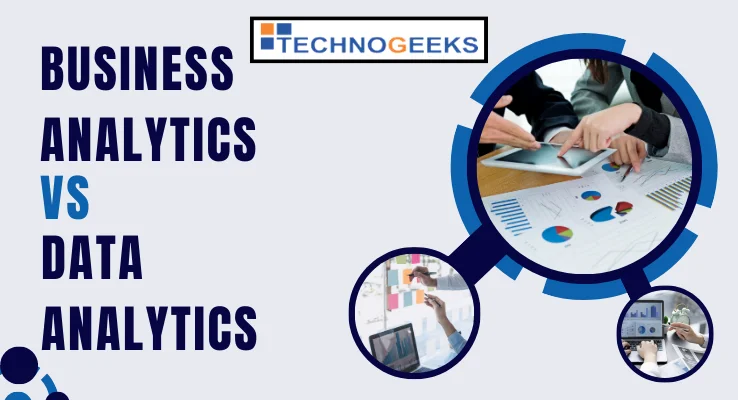Table of Contents
ToggleBusiness Analytics vs Data Analytics
Data is simply changing the way that we shop, eat, vote, search, or even whom we marry. Today, we generate large volumes of data invaluable to companies, shops, restaurants, and websites. Analytics is the language of data. It allows us to talk to data and, more importantly, listen to what it tells us. That’s why, in this post, we are going to talk about the key points of business analytics vs data analytics.
This becomes especially critical in today’s workplace. Where data surrounds us. by learning to listen to it; we can uncover hidden trends and insights that ultimately allow us to make better business decisions.
What makes analytics truly amazing is that any system that generates data is a potential information goldmine. This could be a small household, a multi-million dollar company, the snack food stall down the road, or even your own Facebook account.
Why is Data driven Analytics of Interest to Companies?
So, Why is Data-driven Analytics of Interest to Companies? Even non-IT companies? It’s because, with the tsunami of information available, companies need data analytics specialists or data scientists to control, manage and make sense of it all. But there aren’t enough data scientists available for all the data.
Scientists worldwide would still not fill even 20% of the current demand. This is why switching to a career in analytics and big data analytics can be one of the most interesting and lucrative choices you can make.
What is Data Analytics
Companies are constantly collecting huge amounts of data. But in its raw form, this data doesn’t mean anything. Data analytics is the practice of examining raw data to get business-useful insights. These insights are super important to drive smart business decisions.
What a data analyst does is take all this complex jigsaw of data. They take it out and make it something you can use. Analysts can pass these insights on to the company. After interpreting the data, you can then make the most informed decisions.
Now, don’t get confused here! Data analytics and Data science are not the same thing. Data Analytics is a part of the Data science field, and only works on analyzing the data.
You can think of data analytics as a kind of business intelligence used to solve every company’s problems and challenges. It’s all about finding patterns in the data to tell you something useful or relevant about the business operations.
Let’s see how can businesses benefit from using analytics on their website:
So, for instance, how customers engage with a particular product or employees engage with a particular tool armed with data insights. Companies are then able to make better decisions about their audience, a company as a whole and the industry in which they work.
Data is everywhere, so it actually has an infinite amount of uses across all kinds of businesses and organizations globally. Data analytics is used to make faster and better business decisions to reduce overall business costs and to develop new and innovative products and services.
In more specific terms, data analytics applications are as follows…
- to predict future sales
- purchasing behaviors for security purposes to help and protect against fraud
- to analyze the effectiveness of marketing campaigns
- to boost customer acquisition and retention
- to increase supply chain efficiency
Data Analytics and data analysis are not the same. Click here to learn more about data analysis.
What’s Business Analytics
Data is one of the most valuable resources in today’s ever-changing market. Across industries, professionals collect, analyze, and interpret data to inform decisions and drive organizational performance. This process is called business analytics.
Let’s see the four types of business analytics –
- descriptive,
- diagnostic,
- predictive,
- prescriptive.
Descriptive analytics
Descriptive analytics serves as the foundation and answers the question, what happened? It does so using current and historical data to describe trends and relationships. Descriptive analytics is especially effective for communicating change over time, such as tracking and reporting a business’s website traffic.
Diagnostic analytics
The next logical question is– why did this happen? Diagnostic analytics answers that. It helps determine the root cause of trends and correlations between variables. For example, a meal kit delivery company can gather data on why people cancel subscriptions to improve its products and services and retain customers.
Predictive analytics
Predictive analytics have answers for the question, what might happen in the future? It utilizes past data to forecast scenarios, trends, and events to inform business strategies. For instance, marketers can use prior years’ data to forecast sales trends and plan campaigns accordingly.
Prescriptive analytics
Prescriptive analytics tells what to do next. It involves considering all relevant data to chart an optimal path forward. Product managers for a new mobile app can employ beta testing to determine which features to include or exclude to optimize the user experience.
Leveraging these business analytics types in pairs can provide a full picture of the story data tells and lead to more informed decision-making. There are many business analytics applications that are possible using these types of business analytics.
Difference between Business analytics vs data analytics
We often have a question – is business analytics and data analytics same? They both work on the data but there are a few key differences in their approach.
Let’s see some of the key differences between Business analytics vs data analytics:
| Topic | Data Analytics | Business Analytics |
| Focus | It focuses on analyzing and drawing insights from raw data | It focuses on applying those insights to solve specific business problems |
| Objective | Aims to uncover patterns, correlations, and trends in large data sets | Aims to optimize business operations, improve decision-making, and drive growth and profitability |
| Skills | Requires strong statistical and computational skills to analyze and interpret data | Requires a deep understanding of business operations and strategy in addition to analytical skills |
| Techniques | Utilizes statistical and computational techniques to analyze data | Utilizes techniques such as predictive modeling, data visualization, and performance metrics to inform decision-making |
| Outputs | Data models and visualizations that communicate insights | Actionable insights that can drive business value |
Difference between Data analyst and Business Analyst
Who is business analyst
As the name implies, a business analyst profile is more concerned with the data’s business implications. he uses data to help streamline and improve the business metrics of the organization, like,
- revenue generation
- marketing operations
- resource allocations
he tends to answer questions like
- what a business need
- what problems it is facing
- how to optimize its operations
Who is a data analyst?
A data analyst is a person who collects, analyzes, and interprets numeric data using statistical tools and turns them into meaningful language. He creates reports and visual presentations to make strategic business decisions easily.
Although both business analysts and data analysts work with the data, the difference lies in what they do with it. The ultimate goal of a business analyst is to help make practical and concrete decisions for an organization. The end goal of a data analyst is to gather and analyze data for the business to evaluate and use to make decisions on their own
Now let’s compare the two based on the skill set they possess
Business Analyst Skills
- analytical skills
- feasibility analysis
- SWOT analysis
- interface analysis
- computer skills
- MS PowerPoint
- MS Excel
- and other Microsoft applications
- problem-solving skills
- critical thinking skills and
- interpersonal communication skills
Want to improve your spoken English skills? Read this article to get some tips.
Skills of Data Analyst
- strong analytical skills
- data warehousing
- Adobe and Google Analytics
- programming knowledge
- Python
- R language
- reporting
- data visualization
- statistical knowledge
- SQL or database knowledge
- spreadsheet knowledge
Now that you completely understand what skills are necessary for becoming a business analyst and data analyst let us delve deeper and look into the roles and responsibilities.
Business Analysts Role
The roles and responsibilities of business analyst are:
- understanding the requirements of the business
- analyzing information
- documenting the findings
- evaluating and implementing the finest solution
Data Analysts Role
The roles and responsibilities of data analyst are:
- mining data from primary and secondary sources
- cleaning data to get rid of irrelevant information
- analyzing the results using statistical tools
- interpreting results
- creating data reports and virtual presentations
Now let’s see the business analyst vs data analyst salary:
Data Analytics Salary
A data analyst owns an average salary of dollar 50,000$ 70,000$ per annum
Salary in Business Analytics
A business analyst owns a slightly higher average annual salary of 80,000$ to 90,000$.
There are many Data Analytics jobs and Business Analytics Jobs available. The top companies hiring for the positions of business analyst and data analyst are
- axial wave
- pro Amazon Deloitte and
Conclusion
Every company, from the newest startups to well-established multinational corporations, must use data to drive innovation and growth. With some key distinctions, business and data analytics have the same objective of optimizing data to increase effectiveness and solve issues.
Whichever route you take, you’ll need to swiftly, efficiently, and securely collect reliable data from a variety of sources. Technogeeks provides the best environment to grow your analytical skills in the route of your choice. Even if you are unsure, our counselors can help you choose one. So, If you are looking for data analytics courses in Pune; Check out our course page below and get ready to dive into the world of analytics!















